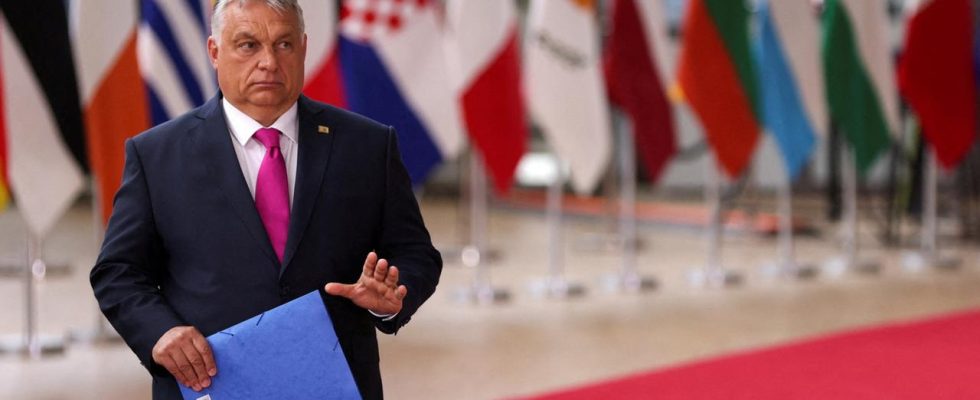Hungary’s Prime Minister Orban created a threatening atmosphere ahead of the EU summit on Thursday – to the detriment of Ukraine. There is speculation as to why. But it’s probably about the money.
It was an unusual statement for an EU meeting: “The dictator is coming,” said the then EU Commission President Jean-Claude Juncker clearly eight years ago when the Hungarian Prime Minister Viktor Orban arrived at the EU summit in Riga, Latvia – at to repeat the phrase again when shaking hands as a greeting: “Dictator!” A friendly slap on the cheek followed.
Today, in 2023, the relationship between the two may have cooled down significantly, but Juncker and Orban come to the same conclusion on one thing: they consider Ukraine to be an extremely corrupt country.
Jean-Claude Juncker liked to wear his shirtsleeves – Viktor Orban also experienced this at several summits.
Orban’s dark threatening backdrop
But while Juncker has long been a political pensioner and only speaks out of retirement in interviews, the man from Budapest is, to the regret of many, a central figure before the upcoming EU summit. He has created a dark threatening backdrop – even by his standards – and has threatened to put several big obstacles in Ukraine’s way at the EU summit on Thursday.
However, many in Brussels are asking themselves: How far is Orban actually willing to go? Or does he just want to put pressure on his own finances? So: all eyes on Orban. Once again.
Fighting for the agenda
His first blockade threat: Hungary does not want to accept the previously planned summit agenda and has informed Council President Charles Michel, who is responsible for this, in two letters.
The group of heads of state and government had actually planned to decide to start accession negotiations with Ukraine at the summit. The consensus is that there is still a long, rocky road to membership. However, 26 members want to take the more symbolic political step – Hungary, however, does not. And nothing works in the Council without unanimity.
It’s also about the household
The Hungarians are also saying: Nem, i.e. no, for another project. The EU wants to make a further 50 billion euros available to Ukraine in the coming years. To this end, the EU budget should be changed. And this also requires unanimity.
As a plan B, those willing could organize financial support for Ukraine beyond the budget. If necessary, without Hungary. But what signal does that send?
A certain tiredness in the EU to support Ukraine is more noticeable than before. EU foreign policy chief Josep Borrell said: “I hope that European unity will not be broken, because this is not the moment to weaken our support for Ukraine.”
Gabrielius Landsbergis, Foreign Minister of Lithuania, showed outrage at the blockade threats in Brussels on Monday. If the country gets its way, “dark times” could lie ahead for the EU.
A mystery for many
Many in Brussels’ European Quarter, but also in the EU capitals, are puzzling in the days and hours before the summit: What exactly does Orban want with his announced blockade? The English “Guardian” reports that Orban’s confidants are in the USA for talks to meet Republicans.
The newspaper quotes a diplomatic source close to the Hungarian embassy: “Orban is confident that the Ukraine aid will not be accepted in Congress. That is why he is trying to block EU aid as well.”
Does he want to harm Ukraine? Without question, Orban, along with Slovakian Prime Minister Robert Fico, is considered a Putin sympathizer and only let him know in October during a meeting in Beijing that Hungary had “never wanted a confrontation with Russia.”
Is Orban gambling for blocked funds?
Or does Orban just want to build up maximum pressure to drive up the price of his approval? It’s about a lot of money, many billions, which the EU Commission has blocked. For years, Hungary has been accused of undermining basic EU values and the principles of the rule of law.
Now it is said in Brussels that the EU Commission is about to release around ten billion euros. Even if there were no connection between this process and the Orban blockade before the summit, the proximity triggers speculation. Even those who don’t believe in such a plan say that.
Katalin Cseh, liberal MEP from Hungary, says in an interview with ARD studio Brussels, a release of EU funds would raise “concerns about the EU Commission’s commitment to upholding the rule of law.” There has been some progress due to pressure from the EU. However, it is obvious “that the country does not currently meet the minimum standards”.
Green MP Daniel Freund also rejects the possible release of the funds and instead calls for tougher action against Hungary. He speaks of “renewed blackmail” by Orban. And: The situation is “more confrontational than at previous summits.”
It is still a long time until the 27 heads of state and government leave the summit building on Friday. Will there then be an agreement or a big failure at the end of the year?
It wouldn’t be the first time that Orban suddenly gave up his resistance without much in return. Until then, he’ll be pretty much alone. But this role usually doesn’t cause too much of a headache for the Hungarian.

